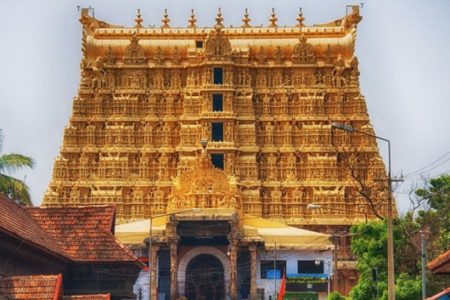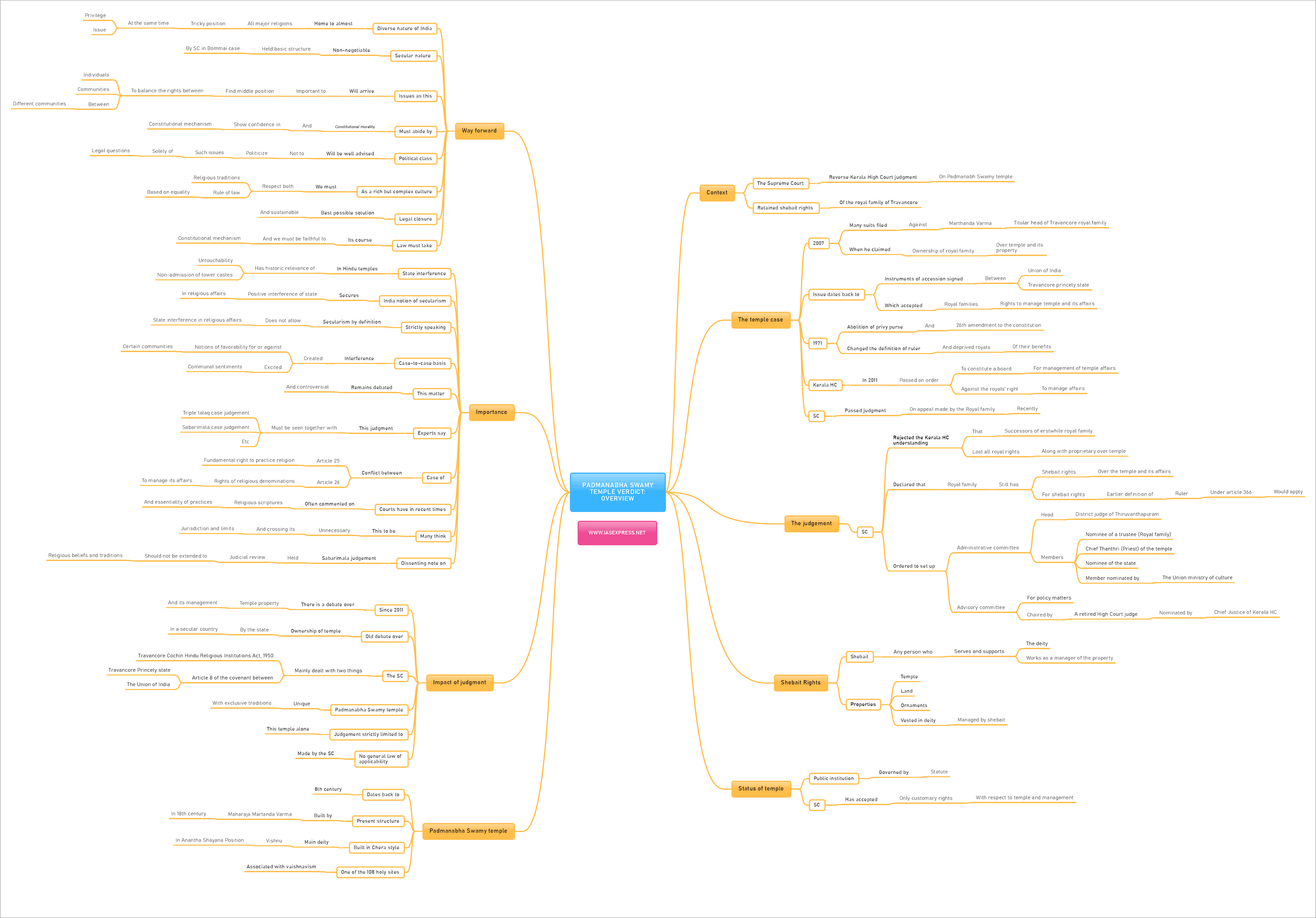Padmanabha Swamy Temple Verdict: overview

From Current Affairs Notes for UPSC » Editorials & In-depths » This topic
IAS EXPRESS Vs UPSC Prelims 2024: 85+ questions reflected
The Supreme Court, recently, reversed the Kerala High Court judgment of 2011 in the Padmanabha Swamy temple case and upheld the right of the Travancore Royal Family to manage the property of deity at Shree Padmanabha Swamy temple in Thiruvananthapuram. This is another historic apex court judgment with respect to the debate of legal-constitutional-state interference in the religious sphere after the Sabarimala Case.
What is the Padmanabha Swamy temple case about?
- The issue surfaced when Marthanda Varma, the last Travancore ruler’s brother and titular Maharaja of Travancore in 2007 claimed the treasures of the temple were the family property of the royals. This was in connection to a property case related to royal family.
- The claim of Marthanda Varma was objected by many and many suits were filed against this claim and a lower court in Kerala passed an injunction against the opening of the vaults.
- The issue dates back to the instrument of accession signed by between the princely states and the Government of India which vested the administration of the mentioned temple in trust in the ruler of Travancore (1949).
- The state of Kerala was carved out in 1956 but the temple management remained with the erstwhile rulers.
- In 1971, when the privy purse was abolished through a constitutional amendment stripping the royal family’s entitlements along with their title as a ruler (article 366(2) was amended by 26th constitutional amendment).
- The Kerala High Court in its judgment in 2011, passed an order that a board be constituted to manage the temple affairs. The ruling was against the royal claim of ownership of the temple and its affairs.
- The appeal against this judgment was filed in the Supreme Court by the Royal family and the current judgment is the culmination of that long-drawn legal fight.
What was the Judgement?
- The Supreme court has rejected the Kerala HC understanding that the successors to the erstwhile royals can’t claim the control of the temple as they lost all royal titles and consequent powers and rights when the definition of title “ruler” was amended by the 26th
- The SC has held that even though royals lost other rights, their shebait rights are still intact even after the death of the last monarch of the Travancore royal family.
- It has held that, for the purpose of shebait rights, the definition of Ruler would apply and would transfer to the successor.
- The SC set aside the Kerala HC order to the state government to create a trust to take control of the temple.
- The SC has directed setting up of an administrative committee under Thiruvananthapuram District Judge as its chairperson. Other members of the committee shall be a nominee of a trustee (Royal family), the chief Thanthri (Priest) of the temple, a nominee of the state, a member nominated by the Union Ministry of culture.
- An Advisory Committee is also to be formed for policy matters. This would be chaired by a retired High Court judge nominated by the Chief Justice of Kerala HC. Both the committees should start functioning within two months from the judgment.
What is a Shebait right?
- A Shebait is any person who serves and supports the deity and works as a manager of the property.
- The properties like the temple or any other land or property which is vested with the deity are managed by the shebait.
- The SC defined shebait as the custodian of the idol, its earthly spokesman, its authorized representative, entitled to deal with all its temporal affairs, and to manage its property.
- The court traced the shebait rights of the royal family to King Marthanda Varma, who rebuilt the temple and installed the idol.
What is the status of the temple now?
- The status of the temple was always recognized as a public institution governed by a statute. The court has only accepted the customary rights of the royal family with respect to the temple and its management.
Padmanabha Swamy temple: Historical importance
- Historians say that the temple dates back to the 8th century but the present structure was built in the 18th century by the then Travancore Maharaja Martanda Varma.
- The temple is built in unique Chera style of architecture and its main deity is Lord Vishnu who is found in the Anantha Shayana posture on Adishesha or king of all serpents. The deity represents the trinity of Brahma, Vishnu, and Shiva.
- It is known to be one of the 108 holy temples associated with Vaishnavism in India.
- It was first made of wood but later constructed with granite as is seen today.
What is the impact of the judgment?
- Since 2011, with starting of auditing the temple treasure and knowledge of huge property in the temple vaults, there was a debate over the ownership of the property.
- There was a debate over despite being a secular country that separates religion from state, Hindu temples, its assets were controlled by statutory laws and boards heavily controlled by the state.
- The Apex court has mainly dealt with two things, The Travancore Cochin Hindu Religious Institutions Act, 1950, and article 8 of the covenant between the Travancore Princely state and The Union of India.
- The Padmanabha Swamy is a unique temple with exclusive traditions. The Judgement is strictly with respect to its management according to customary rights.
- So, it appears that no general law of applicability has been laid down by the court as of now.
- Hence it can be said that the judgment has concerned itself with the shebait rights of the royal family and administration of the temple.
Why the judgment is important?
- The Hindu temples and its management and states interference in it has been historically to do away with certain aspects lie untouchability, banning of temple entry for lower castes.
- The Indian notion of secularism permits positive interference in the religious sphere. Doing away with untouchability is a noble constitutional cause and state’s interference is welcome in such cases.
- The notion of a secular state, strictly, does not permit state control of religious places. Also, the case-to-case basis control of the state has created a notion of favorability for or against certain religions consequently exciting communal sentiments.
- The matters remain in debate as the court has not dealt with this issue specifically.
- According to some experts, this judgment must be seen along with other landmark judgments like Sabarimala case, the triple talaq case, and other cases like the entry of women near the shrine in Shani Shinganapur, Haji Ali main in Mumbai.
- It brings out a larger question of contradiction between the articles 25 and 26 which are the articles of fundamental rights.
- Article 25 says that all persons are equally entitled to freedom of conscience and the right to freely practice religion and its practices. On the other hand, article 26 gives religious denomination or any section right to manage and maintain institutions of religion and right to manage its affairs and right to administer a property according to law.
- Article 25 guarantees individual rights and article 26 guarantees the rights of religious communities. Above mentioned cases reveal a contradictory nature when it comes to certain traditional practices.
- When courts decided these cases, they not only dealt with legal issues and legal rights but they also commented on the religious scriptures and validity of a certain custom or tradition according to religious scriptures.
- While deciding on triple talaq, the majority judgment noted that “what is bad in theology is bad in law”.
- The courts often use the doctrine of essentiality when it comes to judging a certain practice is essential to the practice of certain religion.
- Many think that it is for courts to decide on wisdom in religion and its scriptures. It must not cross its jurisdiction and limits of expertise and should not comment on the religious practices and traditions from a religious standpoint.
- Even a dissenting note in the Sabarimala judgment held this view and said that courts should not extend judicial review of religious belief should not be done as courts cannot impose their morality and rationality on the form of worship of a deity. If done, it would open floodgates to interlopers to question religious beliefs and practices even if the petitioner is not a believer of a particular religion or worshiper of the shrine.
What is the way forward?
- The diverse nature of India, being home to almost all the major religions in the world, is a very tricky position to be in. It is a matter of satisfaction on one side for its truly tolerant nature, at the same time, some times it creates issues like those mentioned above.
- The secular nature of the Indian state is non-negotiable and rightly held as a basic structure of the Indian constitution in S.R. Bommai judgment by the SC.
- The issues such as these are ought to arrive in such a diverse country and we have to find a sound middle path to balance the rights of individuals and communities as per the mandate of the constitution.
- While doing so, we must abide by the constitutional morality and must show confidence in the constitutional mechanism in place.
- The political class will be well advised not to bring religious issues in political debates, as in, they should not politicize the religious issues.
- As a country with rich and complex traditions, we must respect both religious practices and the rule of law based on equality.
- A legal closure based on facts and rationality are the most sustainable resolution of such cases. We must not cross the wisdom and limits of law and justice while we venture into reform or protection of old traditions.
- The law and judicial process must take its course and we must abide by and be faithful to the aggregate wisdom of our judiciary which is the product of the general will of Indian people, i.e. the constitution of India.
Conclusion
The secular nature of India, as it is a unique experiment different from western notions, must be allowed to evolve its own course. There will be confrontations with regards to its fairness, universality, and wisdom, they must be resolved through proper channels and the verdict must be respected. As said before, we are an evolving nation with many unfinished issues of integration of state, socio-economic reform, democracy, and constitutionalism. A sound modern India will be well served by a wise citizenry with constitutional outlooks and practices.
Practice Question for Mains
What is the Indian notion of secularism? What are the challenges associated with it and what are the possible solutions? (250 words)
If you like this post, please share your feedback in the comments section below so that we will upload more posts like this.



